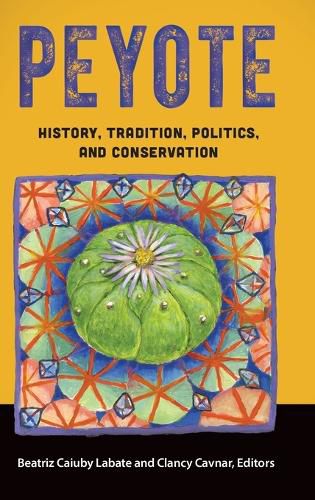Readings Newsletter
Become a Readings Member to make your shopping experience even easier.
Sign in or sign up for free!
You’re not far away from qualifying for FREE standard shipping within Australia
You’ve qualified for FREE standard shipping within Australia
The cart is loading…






This book explains the role that peyote-a hallucinogenic cactus-plays in the religious and spiritual fulfillment of certain peoples in the United States and Mexico, and examines pressing issues concerning the regulation and conservation of peyote as well as issues of indigenous and religious rights.
Why is mescaline-an internationally controlled substance derived from peyote-given exemptions for religious use by indigenous groups in Mexico, and by the pan-indigenous Native American Church in the United States and Canada? What are the intersections of peyote use, constitutional law, and religious freedom? And why are natural populations of peyote in decline-so much so that in Mexico, peyote is considered a species needing special protection ? This fascinating book addresses these questions and many more. It also examines the delicate relationship between the needs of the plant as a species and the needs of man to consume the species for spiritual purposes.
The authors of this work integrate the history of peyote regulation in the United States and the special trust responsibility relationship between the American Indians and the government into their broad examination of peyote, a hallucinogenic cactus containing mescaline that grows naturally in Mexico and southern Texas. The book’s chapters document how when it comes to peyote, multiple stakeholders’ interests are in conflict-as is often the case with issues that involve ethnic identity, religion, constitutional interpretation, and conservation. The expansion of peyote traditions also serves as a foundation for examining issues of international human rights law and protections for religious freedom within the global milieu of cultural transnationalism.
Explains the complete history of the peyote plant in the United States, presenting views from religions including Native American and Christian churches, the creation and evolution of U.S. law regarding peyote, state and federal legal protections since 1990, reasons for the plant’s apparent demise, and arguments for its stronger protection
Identifies current peyote protective laws in Mexico and Canada
Documents how many U.S. residents, including Native Americans, commonly use peyote as a spirituality enhancer or illegal recreational drug within the United States, or do so as tourists when visiting Mexico
$9.00 standard shipping within Australia
FREE standard shipping within Australia for orders over $100.00
Express & International shipping calculated at checkout
Stock availability can be subject to change without notice. We recommend calling the shop or contacting our online team to check availability of low stock items. Please see our Shopping Online page for more details.
This book explains the role that peyote-a hallucinogenic cactus-plays in the religious and spiritual fulfillment of certain peoples in the United States and Mexico, and examines pressing issues concerning the regulation and conservation of peyote as well as issues of indigenous and religious rights.
Why is mescaline-an internationally controlled substance derived from peyote-given exemptions for religious use by indigenous groups in Mexico, and by the pan-indigenous Native American Church in the United States and Canada? What are the intersections of peyote use, constitutional law, and religious freedom? And why are natural populations of peyote in decline-so much so that in Mexico, peyote is considered a species needing special protection ? This fascinating book addresses these questions and many more. It also examines the delicate relationship between the needs of the plant as a species and the needs of man to consume the species for spiritual purposes.
The authors of this work integrate the history of peyote regulation in the United States and the special trust responsibility relationship between the American Indians and the government into their broad examination of peyote, a hallucinogenic cactus containing mescaline that grows naturally in Mexico and southern Texas. The book’s chapters document how when it comes to peyote, multiple stakeholders’ interests are in conflict-as is often the case with issues that involve ethnic identity, religion, constitutional interpretation, and conservation. The expansion of peyote traditions also serves as a foundation for examining issues of international human rights law and protections for religious freedom within the global milieu of cultural transnationalism.
Explains the complete history of the peyote plant in the United States, presenting views from religions including Native American and Christian churches, the creation and evolution of U.S. law regarding peyote, state and federal legal protections since 1990, reasons for the plant’s apparent demise, and arguments for its stronger protection
Identifies current peyote protective laws in Mexico and Canada
Documents how many U.S. residents, including Native Americans, commonly use peyote as a spirituality enhancer or illegal recreational drug within the United States, or do so as tourists when visiting Mexico